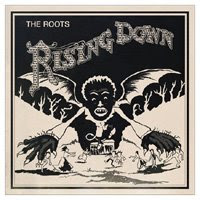For me, this cocaine rap thing was tolerable with Juelz and his "Back Like Cooked Crack" mixtapes. I even sang along to "...stay on the grind like clockwork". But then Jeezy made his appearance on the scene with his trademark 'snowman' alias. At this point it started sounding like a jackhammer going off non-stop. After, Rick Ross' "Hustlin", I was done. I was pretty much burned out on raps dedicated to the hustlin of that hard white. Now I just refuse to get it anymore. I mean, these are wonderful street anthems (i guess-they get a lot of radio play). And it's easy to see why these artists get plenty of love not to mention street cred. It's almost like a dedication to the hustler's way of life, why wouldn't the streets love it. I'm in no way downing it and wishing it away forever, but it would be nice to get a break from it once in awhile. For one, it does not serve as ideal music for this generation's youth, who in my opinion are already heading down the wrong road. And two, there are only so many ways in which you can try to diversify the "ways in which you're pushing that". It pretty much depends on the beat at this point to make the song a hit. I don't know when it will ever end. I thought that at a certain point, an artist's music reflects their way of life like Jay said. He use to rap about hustlin' and running the streets but now he sips the finest in a yacht on some private island, so that's what he raps about 90% of the time. I mean that makes a lot of sense to me. Maybe certain artists haven't reached that height in their career to make music about anything else.
on the same note....
While surfing the net, I was pleased to find this article entitled, "Cocaine Rap Continues to Resonate", check it out:
"Cocaine and hip-hop share a long history, but over the last few years, there's been a surge in coke-themed songs and artists -- aka crack rap. The roots of this fad date back to 2002, with the critical and commercial success of both Scarface's "The Fix" and especially the Clipse's "Lord Willin".
While Scarface spoke mostly on the necessary evils of drug dealing, the Clipse's Pusha T and Malice gleefully glorified hustling as the way into wealth rather than path out of poverty. Their songs were cartoonishly outrageous, even by Tony Montana-standards, as they co-opted children's rhymes into coke boasts and dropped punch lines about yayo-smuggling grandmothers.
Four years later and the genre shows little sign of decline. Bay Area rapper E-40 started off 2006 with his ode to blow, "White Gurl." Then a parade of mixtapes like Juelz Santana and Lil Wayne's "I Can't Feel My Face" kept things frosty until the last few weeks where Jay-Z's "Kingdom Come," the Clipse's "Hell Hath No Fury" and Young Jeezy's "The Inspiration: Thug Motivation 102" promise that talk of snow this winter won't necessarily be about the weather.
One of the more fascinating outcomes of crack rap's bubbling rise is in its impact on how artists position themselves through a new paradigm of authenticity. Rappers used to rap about rapping. Parochial as it sounds, for at least 15 years, this was good enough to turn lyricists such as Rakim and KRS-One into legends. However, in a slow and steady shift that began with pioneering gangsta rappers like Schoolly D and Eazy-E and then found its apotheosis in Biggie and Jay-Z, being a good rapper was no longer enough to be a good rapper.
To wit: On Jay-Z's 1997 "In My Lifetime, Vol. 1," he opens with this intro: "I ain't no rapper, I'm a hustler. Just so happens I know how to rap." Subtle as it may seem, Jay exemplified a new narrative arc for the king emcee -- from ruler of the crack game to the rap game. Even on "Kingdom Come," his ninth album and first since "retiring" three years ago, Jay is repeating the same message: "I'm just a hustler/disguised as a rapper/in fact you can't fit this hustle/inside of a wrapper." At the core of Jay's boasting is how's he's gone from cooking up crack hits to cranking out rap hits, but even if the background's changed, the hustle remains the same.
Today's cocaine rappers manage to take that even a step further: They never left the kitchen to begin with. It's a point made visually on the cover of the Clipse's "Hell Hath No Fury," where Pusha and Malice stand next to a gas-range oven. As they insist on "Keys Open Doors" (they're not talking about Schlage), they've earned enough off coke that they "ain't spent one rap dollar in three years, holla." It's a remarkable and utterly illogical pose: Rappers are rapping about not being rappers, yet there's an odd appeal in listening to artists promote their craft by negating it. Only in hip-hop.
It has not escaped notice that for all the pleasure in celebrating the hustler's credo, the subgenre is, well, amoral, not to mention divorced from reality. Few street dealers ever made fortunes off cocaine -- the profits blew up the chain to the cartels -- and in any case, cocaine and crack use (and related violence) have fallen precipitously since the mid-1990s.
It's tempting to read crack rap as a form of imagined nostalgia. Most of these rappers would've been too young to remember the height of the crack epidemic in the '80s, yet this may be what makes it easier to romanticize the trade and gloss over its deleterious impact. However, what's being promoted isn't nihilism, despite appearances otherwise: It's crack as a metaphor for power. Drugs are deeply symbolic in our culture -- not just in hip-hop but American pop life -- of escape, pleasure, obsession and despair. For a young cadre of rappers trying to one-up their peers, coke has resonated as their signifier for mastery and control.
If hip-hop respects nothing else, it's the idea that simple things can move minds and bodies, whether that power is found in a gun trigger, a raised fist, a mic grip or, as it now seems, trapped in a glass vial. Topically, the trend has to exhaust itself eventually -- in theory at least. When it does, what will future generations think of this crack-rap era? Will they see it as a colorful fad, like polka dots and pastels from the late '80s? Or will they curiously wonder how it is that as fans and artists alike, we stared at the dystopia of cocaine culture and reacted, not with concern or horror, but with rapt fascination and celebration?"
this was seen over at contracostatimes.com



